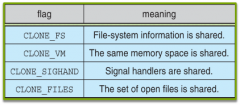![]()
![]()
![]()
Use LEFT and RIGHT arrow keys to navigate between flashcards;
Use UP and DOWN arrow keys to flip the card;
H to show hint;
A reads text to speech;
14 Cards in this Set
- Front
- Back
|
What is the difference between parallelism and concurrency? |
Parallelism means the system can perform more than one task simultaneously while concurrency means there can be more than one active task making progress. |
|
|
What are the two types of parallelism? |
Data Parallelism - distributing data across multiple stores. Task Parallelism - distributing tasks across multiple processors |
|
|
True or False: Each new thread shares only its Heap, Data and Text areas of memory with the other threads in the same process |
True. Threads have the same code and global memory as other threads in the same process, but they each have their own separate Registers and Stack. |
|
|
What does Amdahl's Law tell us? |
The speedup you can reach by adding more cores to your computer (taking into account what percentage of the program is serial and no-serial) |
|
|
What are the advantages of the many-to-many threading model (between user threads and kernel threads)? |
Many-to-one threads allow the user to create as many threads as he wants, but doesn't take of advantage of true concurrency. One-to-One takes advantage of true concurrency but programmer must make sure not to create more user threads than kernel can handle. Many-to-many thread model allows real concurrency and also takes care of programmers who make too many threads (simply adds to Kernel threads when max is reached) |
|
|
What are Pthreads? |
A specification (not an implementation) for POSIX thread APIs, common in UNIX systems |
|
|
What are thread pools? |
Pre-made threads that are ready to accept new tasks, requests, etc. Having them ready in a pool is more efficient than creating them as they are needed especially if many requests in quick succession are expected. |
|
|
What does #pragma omp parallel mean in OpenMP? |
It essentially tells the compiler to create as many threads as there are cores and run the code in the following block |
|
|
What is Grand Central Dispatch? |
An Apple technology, API, etc extending C languages providing syntax and mechanism to run concurrent threads from a dispatch queue. |
|
|
Some UNIX-based OSs have another function similar to fork(). What is it and what is the difference with fork(). |
clone(), which creates a new thread (not process) in the same process space. fork() creates a new process containing one thread. |
|
|
Linux has about 30 standard signals. How is Signal 2 called? |
By pressing CTRL+C to interrupt a process |
|
|
What are the two general approaches to Thread Cancellation? |
1) Asynchronous Cancellation : cancel the thread outright immediately 2) Deferred Cancellation: the thread checks periodically if it should be cancelled |
|
|
In Pthreads, what is Thread Local Storage? |
A mechanism that allows threads to have their own storage space - similar to static variables in C. |
|
|
What flags can be passed to clone() in Linux, when creating a new thread? |

|

